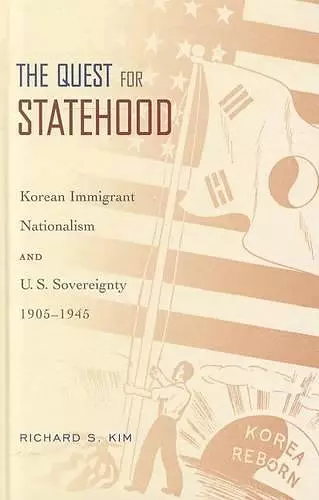The Quest for Statehood
Korean Immigrant Nationalism and U.S. Sovereignty, 1905-1945
Format:Hardback
Publisher:Oxford University Press Inc
Published:8th Dec '11
Currently unavailable, and unfortunately no date known when it will be back
This hardback is available in another edition too:
- Paperback£28.99(9780195370003)

Korean diasporic nationalism in the years between 1905 and 1945 played a foundational role in the emergence of the two separate Koreas after 1945 that both exist to this day. Koreans in the United States were a constitutive part of this historical trajectory. The Quest for Statehood traces the development of Korean immigrant nationalism within the context of the Korean independence movement which sought to liberate Korea from Japanese colonization. Regarding Japanese rule as illegitimate, Koreans in and out of the Korean peninsula viewed themselves as stateless peoples who wanted to establish a sovereign state of their own. Given Japanese repression in Korea, independence activities had to be carried out from abroad, creating conditions for the emergence of a diasporic nationalism. Situated at the nexus of geopolitical relations involving Korea, Japan, and the United States, Koreans in America came to play a vital role in the state-building project of Korean diasporic nationalism. The Quest for Statehood explores the consequences and implications of Korean diasporic identifications with the homeland in a U.S. setting. Due to the constraints of diasporic state-building, U.S.-based Koreans increasingly came to rely on the power of the United States to act as a sovereign state to pursue the national interests of Koreans throughout the diaspora. This study contends this strategic reliance on U.S. state power reflected the development of an ethnic consciousness among Korean immigrants in America. The efforts of Korean immigrants to fight for the independence of their homeland necessitated their participation in civic and political activities in the United States that established them as an American ethnic group. Korean nationalism thus paradoxically led to Korean immigrant incorporation into American political structures whereby ethnicity served as an organizational resource for making nationalist claims in the U.S. political arena. Ultimately, homeland nationalism was central to the assimilation of Korean immigrants as American ethnics.
This monograph goes a long way in explaining how Koreans clientelistic reliance on American patronage before World War II shaped a similarly dependent relationship of anticommunist development after 1945. * Todd A. Henry, American Historical Review. *
Richard Kim's excellent book adds to a small but growing number of works to take a disaporic approach to the study of Asian communities in the United States... In taking on this important subject, Kim joins such historians as Madeline Y. Hsu, Adam McKeown, and Eiichiro Azuma in bridging Asian and American Studies, ultimately enriching both fields. * Journal of American-East Asian Relations *
This monography makes two significant contributions. First, it connects Korean immigrants' strategies for securing independence for their native land after 1905 -and especially between 1919 and 1945 -to their lack of access to citizenship in the United States. Richard S. Kim skillfully draws on the extensive literature covering U.S. immigrants and their varying conceptions of citizenship to demonstrate that a small group of Korean Americans found themselves in a unique position between 1905 and the end of World War II. * Journal of American History *
A truly transnational history of early Korean immigrants, The Quest for Statehood is an important, path-breaking study. Richard Kim's research rescues Korean immigrants and their politics from the dual clutches of Korean national history and of domestic narratives of Korean American history, bridging Korean studies and Korean American studies. At last, we have a more nuanced, complex understanding of early Korean immigrants beyond the simple image of Korean nationalist heroes or of an oppressed American minority. This book is a major milestone in transnational Asian American history. * Eiichiro Azuma, University of Pennsylvania *
The Quest for Statehood makes the complex issue of nation-building absolutely central to transnational analysis of American immigration and ethnicity. By bringing the state back into diaspora studies, Kim offers a fascinating explanation for the disproportionately large role played by state-less Koreans living in the United States and sheds new light on political developments in far-off East Asia. Here is a powerful illustration of how (and why) immigrants engage vigorously in international relations even as they adapt to life in America. * Donna R. Gabaccia, Immigration History Research Center, University of Minnesota *
ISBN: 9780195369991
Dimensions: 163mm x 236mm x 20mm
Weight: 431g
240 pages